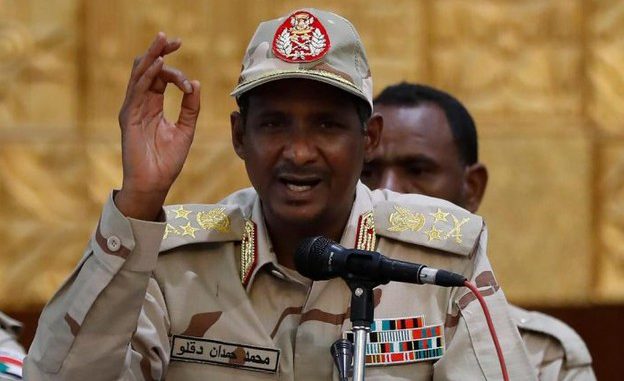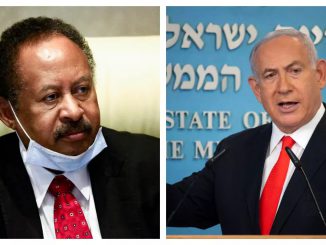
The most powerful man in Sudan, “Hemdati”, wants peace with Israel
In the largest country on the African continent, a heated debate is raging these days about whether to declare normalisation with Israel.
The man who leads the movement at a rather dizzying pace is called “Hemdati” – this is the affectionate nickname his mother gave him as a child and has since stuck to the flag of General Muhammad Hamdan.
This slim, quick and thoughtful man, only 45 years old, is deputy head of the “Council of Sovereignty” (presidency), responsible for the historic peace agreements that have just been signed with some of the country’s rebel organisations and commander of the “Aid Army”.
Unlike other commanders, however, he has never been charged by the International Criminal Court in The Hague. “Hemdati”, a member of a dynasty of camel traders, intends to explain his own version of the bloody events in Darfur soon, where both sides engaged in bloody killings.
Since the end of the fighting there, the people of “Hemdati”, led by their brother, have dominated the rich gold mines of Jabal Amer. Gold accounts for 40 per cent of Sudan’s exports and most of it is shipped to Dubai.
In a series of speeches – sometimes in the face of public outcry – “Hemdati” says: “I am not afraid of anyone. Our support for the Palestinian cause must not leave us under siege. We need links with Israel, not necessarily normalisation. We are moving towards Israel. We have a lot to gain. In agriculture and other areas, the whole world is coming to them. Ministers are not real representatives of last year’s revolution. We have an opportunity and we have to jump on it for the good of the nation. “
Several small parties sided with him and of course the army. The Sudan-Israel Friendship Association was even created and thousands of people joined in a week.
The debate is raging on TV channels and in the lively local press. At the head of the resistance are the parties that have survived since the 1960s – the communists, the Nazarists, the members of the “Ba’at”.
Consequently, the civilian Prime Minister, who was established under a partnership agreement with the army after the revolution “until the elections”, Abdullah Hamduk supports but only silently supports progress towards Israel.
He doesn’t want a jolt. This brilliant economist is married to a well-known communist activist, but finds in many areas a common language with “Hemdati”, which is the exact opposite of him.
They both want to remove Sudan from the list of pro-terrorist countries to encourage investment, get debt relief and receive billions in US aid. It is clear to them that hundreds of millions of dollars will be set aside in advance for compensation awards by US courts for the families of victims of terrorist attacks in Kenya and Tanzania on Sudanese soil.
At an economic conference last week, Hamduk said the transitional government had no authority to recognise Israel.
General President ‘Abd al-Fatah Burhan, who met Netanyahu in Uganda earlier this year, said that no time should be wasted.
The country is on its knees, the floods of the Nile have caused major damage.
The Americans are lobbying to bring the Sudanese to a signing ceremony on the White House lawn within two to three weeks.
They used a roller coaster of bait and threats on Burhan when he came to meet them in Abu Dhabi. But according to reliable sources, some of the Trump administration’s promises have so far not been kept and only a problematic peace equation for money is being woven into the public consciousness, would Sudan sell its honour for a handful of dollars?
Nevertheless, it should be recalled that secret links with Sudan have existed, intermittently, for decades. The late Menahem Begin shaking hands with Sudanese President General Numiiri at Sadat’s funeral in Cairo in 1981.
It was only in the years 2008-2014 that Israel was forced to use force on several occasions against Sudan and to bomb arms shipments from Iran en route to Hamas.
Since the prospect of a warm peace with Sudan is serious, since it is a country with enormous (unrealised) potential, it is precisely for this reason that a multi-stage plan should be developed with them.
It is preferable to prepare in advance the package of envisaged collaborations: from the upgrading of agriculture, for industries, to the coordination concerning flight and navigation in the Red Sea. Everyone in Sudan knows very well that for decades Israel helped the rebels in the south of the country until they gained independence.
The expectations they had of us did not materialise and we, for our part, have nothing to admire in the way they managed their new state.
“Hemdati” is friends with the president of South Sudan, and has heard a lot about his visits to Israel. In other words it is not how but when. Wait and see
Source: Alliance Mag


Be the first to comment